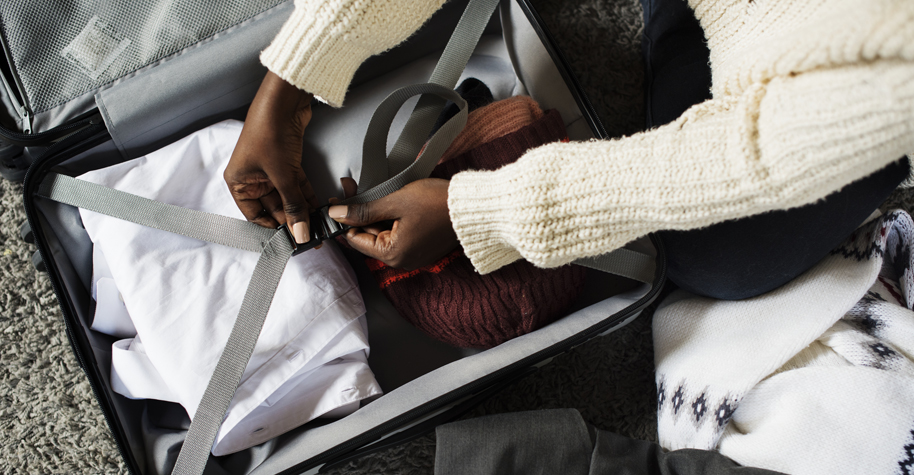Holiday travel often includes visiting loved ones or taking a vacation. Whether you’re seeking a winter wonderland or an escape from subzero temperatures, follow these travel tips to stay healthy and safe during the holiday travel season.
Before Your Trip
No matter where you plan to travel, check CDC’s destination pages for travel health information. These pages include information about
- vaccines and medicines you may need, and
- diseases or health risks that are a concern at your destination.
Get up to date with your COVID-19 vaccines and seasonal flu vaccine. CDC recommends getting the flu vaccine every year.
Get up to date on routine vaccines. Routine vaccinations protect you from infectious diseases such as measles that can spread quickly in groups of unvaccinated people. Many diseases prevented by routine vaccination are uncommon in the United States but common in other countries.
Prepare a travel health kit that includes personal needs, especially those items that may be difficult to find at your destination. Take enough of your prescription and over-the-counter medicines to last your entire trip, plus extra in case of travel delays. You may also want to pack insect repellent, sunscreen (SPF 15 or higher), aloe, alcohol-based hand sanitizer, water disinfection tablets, and important paperwork like your health insurance card.
Make sure you have a plan for getting health care during travel. Find out if your health insurance covers medical care abroad. Travelers are usually responsible for paying hospital and other medical expenses out of pocket at most destinations. Consider buying additional insurance that covers health care and emergency evacuation, especially if you will travel to remote areas.
During Your Trip
Choose safe transportation. Always wear your seat belt. If you are traveling with children ages 12 and younger, make sure they are properly buckled in a car seat, booster seat, or seat belt—whichever is appropriate for their age, weight, and height—in the back seat.
Motor vehicle crashes are the leading cause of death among healthy travelers. Be alert when crossing the street, especially in countries where people drive on the left side of the road. Find out other steps you can take to stay safe on the roads.
Protect yourself from the sun. Apply sunscreen with SPF 15 or higher when traveling. Protecting yourself from the sun isn’t just for tropical beaches. You can sunburn even if it’s cloudy or cold. You are at the highest risk for ultraviolet light exposure during summer months, near the equator, at high altitudes, and between 10 a.m. to 4 p.m.
Stay alert in crowded areas. Does your holiday travel involve markets, festivals, or other activities that involve a large number of people at the same place (mass gathering)? If so, learn some tips to stay safe at a mass gathering.
Considerations for cold weather travel
Wear warm clothing in several loose layers when traveling in cold weather or climates. Learn practical skills and lessons like how to prevent hypothermia and frostbite.
Considerations for warm weather travel
If you are traveling in hot weather or to a hot climate, wear loose, lightweight, light-colored clothing.
Your chances of getting heat stroke, heat exhaustion, or other heat-related illness during travel depend on your destination, activities, level of hydration, and age. The more active you are in high temperatures, the more likely you are to get a heat-related illness. Learn how to prevent heat-related illness.
Use insect repellent and take steps to avoid bug bites. Bugs, including mosquitoes, ticks, and flies, can spread diseases such as Zika, dengue, Lyme, and others. These bugs are typically more active during warm weather. Check your destination’s page to determine what you need to do to protect yourself from diseases spread through bug bites, including medications or vaccines when recommended.
After Your Trip
If you recently traveled and feel sick, particularly if you have a fever, talk to a healthcare professional. Tell them about your travel. Be prepared to answer questions about your vaccination history, destination(s), reasons for traveling, itinerary, and other aspects of your trip.
Resources
- Travelers’ Health | CDC
- Traveler Advice | Travelers’ Health | CDC
- COVID-19: International Travel to and from the United States | CDC
- Cruise Ship Travel During COVID-19| CDC
Thanks in advance for your questions and comments on this Public Health Matters post. Please note that CDC does not give personal medical advice. If you are concerned you have a disease or condition, talk to your doctor.
Have a question for CDC? CDC-INFO (http://www.cdc.gov/cdc-info/index.html) offers live agents by phone and email to help you find the latest, reliable, and science-based health information on more than 750 health topics.
Posted on by Blog Administrator
Tags flu, frostbite, health, heat-related illness, holiday, hypothermia, insect repellent, Sunscreen, travel, trip, vaccination
Original Article – https://blogs.cdc.gov/publichealthmatters/2022/12/travel/





